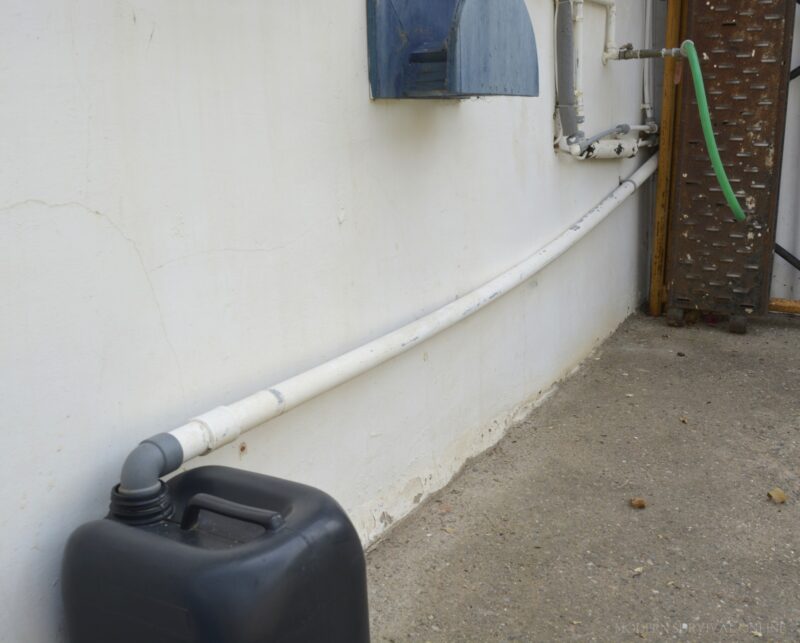Household and homestead water conservation is a big deal to preppers, and definitely one of the pillars of self-sufficiency.

Water is an incredibly precious resource that most of us take for granted, and especially when trying to survive a long-term societal collapse you’ll have to make the best use of resources possible.
One term you’ll hear splashed around a lot during the discussion is gray water. What exactly is gray water?
Gray water is any household wastewater that does not come from the toilet or more specifically water that does not contain human waste. Wastewater from sinks, showers, washing machines, dishwashers and other such appliances qualifies as gray water.
as it turns out all wastewater is not created equal, and knowing how best to process, treat and repurpose wastewater around your home or working homestead could make the difference between having enough or doing without. We will learn more about this interesting topic below.
Gray Water is Waste Water from Everything except Toilets
To further clarify, gray water is any household wastewater originating from any fixture except the toilet and if you want to get really specific it is wastewater coming out of the home that does not contain human waste, solid or liquid.
So this could be water that is left over from doing a sink full of dishes, running the dishwasher on the same load of dishes, doing a load of laundry, hosing off some muddy boots in your mudroom sink, washing your hands, taking a shower or bubble bath, and so forth.
Any water coming from the toilet is black water, whether or not you actually do your business in it. If it is moving through a toilet, it is considered black water.
This isn’t necessarily a showstopper depending on what you want to do with your water, but it definitely informs how you’re going to handle and treat the water and potentially what you will use it for.
Gray Water Can be Repurposed or Purified Fairly Easily
The big takeaway from all this is that gray water is pretty easy to repurpose. Considering it contains useful chemical compounds and less organic matter then black water, it is just the thing for doing outdoor chore washing, irrigation and other tasks. It can even be repurposed into drinking water under certain circumstances.
Even though this water is not fit to drink as is, obviously, because it is going down the drain and contains all sorts of nasty stuff you don’t want in your body, it is not so hideously contaminated that you should just let it go into the sewer or septic tank to be left there.
The trick, of course, is that you’ll need to be ready and able to separate gray water from black water in your home.
The vast majority of homes, whether or not they are hooked up to a public sewer system or a private septic tank or other waste disposal option is that both gray and black water go to the same place, meaning the waste pipe in your home and then out.
With no way to separate one from the other, you have to consider all of it black water and handle it accordingly if you plan on doing anything with it at all.
Benefits of Separating Gray from Black Water
There are many benefits to be reaped for the self-sufficient home or working homestead that manages to separate gray water from black water and keep them separate. although expensive to retrofit, new construction homes are relatively easy to set up with separate drains and piping for routing wastewater from gray or black fixtures to appropriate locations for storage or treatment.
In short, it is possible to adapt a home’s plumbing to keep gray and black water separate at all times.
Doing this, gray water can be directed immediately to an on-site filtration and treatment processor whereas black water can be sent straight to the sewer or to the septic tank. This is far and away the most painless and efficient way to accomplish the task.
However, for households that don’t make use of traditional plumbing or don’t want to go through the aggravation and expense of instituting separate gray and black water handling pipes you can capture gray water in other ways.
Doing the dishes in a tub that allows the water to be carried elsewhere for other purposes is one way that almost anyone can do.
Alternately manual or electric diverters can be set up in drains to route water going down the drain to a separate tank or container. Water from bathtubs could be carried out with buckets and so forth. Although laborious, and to make no mistake it is, where there is a will there is a way and if water conservation is going to be one of the watchwords of your household you can definitely put gray water conservation practices in place no matter your physical living arrangements.
Take Care before Using on Plants
Most gray water is ready to use for a variety of purposes outside the home. It certainly works well enough for hosing off masonry, sidewalks, driveways and washing other, dirtier things like muddy tools or tires.
Basically any situation where you’re not using the water for drinking or using it on things that you will drink or eat.
However, care must be taken before using gray water on your plants, be they ornamentals or produce growing in your garden.
This is because many household detergents, cleansers, cleaners, shampoos, conditioners and all the rest contain chemicals that can seriously harm your plants and even contaminate your soil adversely for the growing of various plants.
Much of the organic matter present in gray water, usually the form of food particulates, is good for the soil over time but the rest of this stuff will need to be removed.
This is why suitable filtration or chemical treatment is required for reliably using gray water to water your fruits, veggies and other plants. You don’t want all the hard work and effort you put into directing, treating and storing your gray water to wind up doing more harm than good!
Storing Gray Water
One of the great things about gray water as compared to potable drinking water is that it is easy to store.
You aren’t really worried about the formation of algae in it, and it doesn’t matter so much if it leaches a little bit of plastic, chemical-laden residue from its storage tank. You aren’t going to be drinking this stuff unless you take the time to thoroughly purify and treat it.
This means that common, inexpensive and easy to maintain tanks and containers of all sizes can suit the purpose, and many of them are ready to be utilized with sprayers and other equipment directly for a variety of jobs around your property. You can find containers like this pretty much everywhere but they are especially common at farm and rural supply stores.
It’s nice not having to worry so much about taking diligent care of your water supply for once!
So There You Have It…
Gray water is household waste that originates from any fixture besides a toilet and is water that does not contain human waste.
Gray water is ideally suited for reuse outside the home for numerous tasks, but one must make provision for directing it and storing it separately from black water prior to treatment.

Like what you read?
Then you're gonna love my free PDF, 20 common survival items, 20 uncommon survival uses for each. That's 400 total uses for these dirt-cheap little items!
We will not spam you.